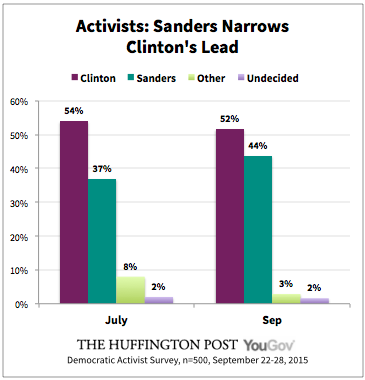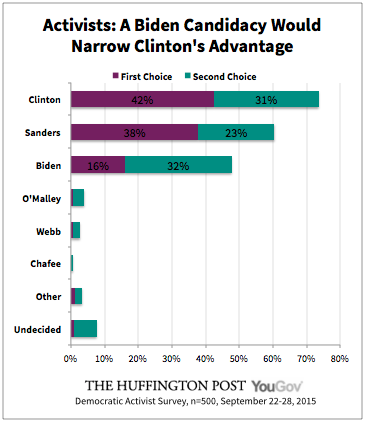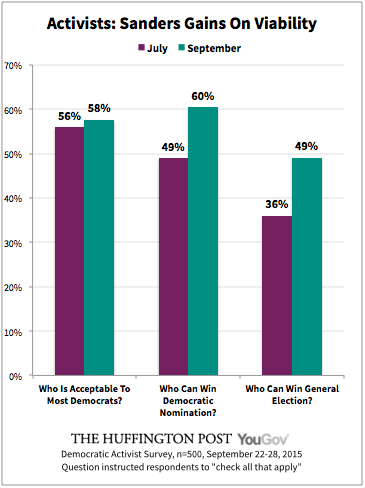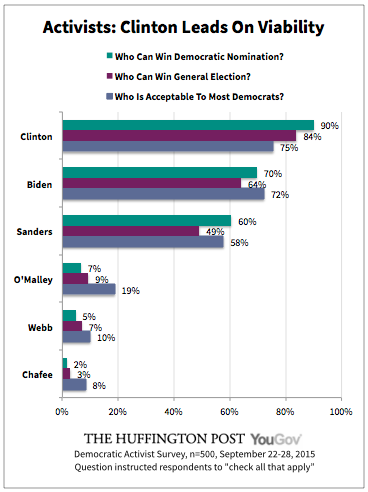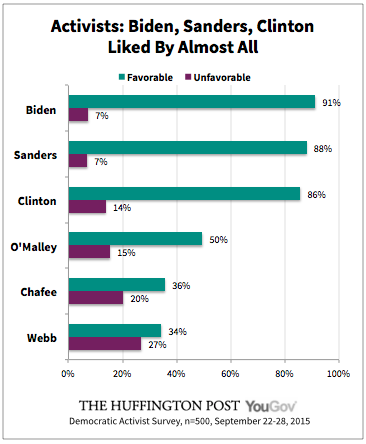
Sen. Bernie Sanders' surging poll numbers and record-breaking crowds have convinced his party's grassroots base to take him more seriously as a viable nominee, a new HuffPost/YouGov survey of Democratic activists finds.
But the shift may not be enough to make him the first choice of party activists, among which Hillary Clinton still holds a diminished advantage. And, as the Democratic candidates prepare for their first debate this week, both Clinton and Sanders face added complications from Vice President Joe Biden's possible entry into the race.
To better understand the "invisible primary" among party insiders, The Huffington Post has been working with our survey partner YouGov to scour its Internet survey panel for activist Democrats: those who have run for or held office, served as party officials, worked on campaigns or volunteered their time before elections. Our second survey of 500 of these activists provides a look at the opinions of some of the Democrats' best-informed and most politically involved supporters. (We also sampled and reported on Republican activists separately.)
As we found in July, activist Democrats are far more informed and engaged in the campaign than ordinary voters, and far more decided than their Republican counterparts. Four out of five Democratic activists (82 percent) now say they have a good idea of who they'll vote for, compared to just 42 percent of Republicans.
The current snapshot of activist opinion shouldn't be considered a prediction of who will end up winning. For one thing, as we found in July, the Democratic activists surveyed are significantly more liberal and white than the party as a whole. But it may provide a better snapshot of where the campaigns stand right now than polls of the wider but less engaged Democratic electorate.
Demographically speaking, the kind of Democrats included in this survey should be exactly the kind of people to rally around Sanders. The Vermont senator has gained support among 44 percent of the activists (up from 37 percent in July) and halved Clinton's lead from 17 to 8 percentage points. For the moment, all of the other candidates combined have won over just 8 percent combined. Yet without Biden in the race, Clinton maintains the support of a slim majority of Democratic activists (52 percent), with most of the rest (44 percent) supporting Sanders.
When Biden is included in the polling, the vice president gains the support of 16 percent of the activists, taking a larger bite out of support for Clinton (which falls to 42 percent) than for Sanders (38 percent). Should Biden choose to run, a significant portion of grassroots activists will have a tougher choice to make.
While Clinton is still viewed as the most viable candidate -- 90 percent think she can win the nomination, and 84 percent say she can win the general election -- activists' skepticism that Sanders has a shot at the presidency has waned since the summer. In July, 49 percent of the activists believed Sanders could win the nomination, and just 36 percent thought he could win the general election. In the most recent survey, those numbers jumped to 60 percent and 49 percent, respectively.
Eighty-eight percent of Sanders' supporters now think he's capable of becoming the next president, up 17 points since July. By contrast, while more than 40 percent of Clinton's backers now think Sanders could prevail in the primary, fewer than 1 in 4 think he could defeat a Republican rival.
Biden, who wasn't included in the earlier activist survey, is also widely seen as electable, scoring somewhere between Sanders and Clinton on both measures. Seven in 10 Democrats think Biden could win the nomination, and 64 percent think he could win the presidency.
Democrats' relative optimism about their leading contenders' chances contrasts markedly with the more fractured Republican primary, in which no candidate is seen by more than 53 percent of GOP activists as capable of winning the general election.
Democratic activists also give sky-high favorability ratings to all three leading candidates: 86 percent for Clinton, 88 percent for Sanders, and 91 percent for Biden, numbers that have changed little since the summer. Most also are prepared to rally behind whomever ends up getting the nod. Just 16 percent would be upset if any of those three candidates were nominated and only 14 percent say they personally wouldn't be able to support one of them for president.
In contrast, former Maryland Gov. Martin O'Malley, former Virginia Sen. Jim Webb and former Rhode Island Gov. Lincoln Chafee remain largely nonentities, polling at about a combined 1 percent support among the activists. (Larry Lessig, who's polling at a consistent 0 percent in national averages, was not included in the survey.)
O'Malley is rated favorably by half of those surveyed, while Chafee and Webb draw more mixed reviews. Nearly a quarter of Democrats would be unhappy to see one of them named as the nominee.
Although the Democratic side of the race looks considerably more settled than the GOP campaign, one very big uncertainty remains: Will Biden join in? If he doesn't, Clinton will maintain an advantage among the party's most highly engaged, mostly liberal, mostly white activists. If he does, among the activists, those preferences will narrow.
The survey consists of 500 completed interviews of self-identified Democrats selected from YouGov's opt-in online panelists who met the screening criteria for party activism. Interviews were conducted Sept. 22-28, 2015. Full results of the survey are here and crosstabulations are here.
The screening criteria were as follows: Respondents who think of themselves as Democrats, say they would vote in a Democratic primary in their state and say they have either run for office, held elected public office, been a paid staffer for a political campaign or elected official, been a party official or substantively contributed time or money to a campaign.
For weighting purposes, a sampling frame was created based on the American National Election Studies using similar measures of political activism. Cases were weighted to the frame using an iterative process known as raking. Weights were based on party identification, age, gender and education.
The Huffington Post has teamed up with YouGov to conduct daily opinion polls. You can learn more about this project and take part in YouGov's nationally representative opinion polling. Data from all HuffPost/YouGov polls can be found here. More details on the poll's methodology are available here.
Most surveys report a margin of error that represents some, but not all, potential survey errors. YouGov's reports include a model-based margin of error, which rests on a specific set of statistical assumptions about the selected sample, rather than the standard methodology for random probability sampling. If these assumptions are wrong, the model-based margin of error may also be inaccurate. Click here for a more detailed explanation of the model-based margin of error.
